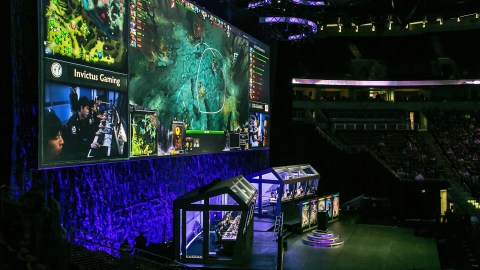Are E-Sports Really Sports?

Like many people this time of year, I am interested in watching winter sports. Skiing, snowboarding, ice skating, and hockey all take up time on my television screen. And this time of year also means Winter X Games. Just this past weekend, the annual competition pitted contestants against one another in a variety of thrilling, extreme challenges: snowmobile freestyle, snocross, ski big air, and snowboard superpipe. But, if you watched closely, and happened to tune in at exactly the right time, Winter X Games this year also debuted an e-sport as part of its lineup. In partnership with ESPN, the Winter X Games made Halo 5: Guardians a part of its competition. And at least one freestyle skier doesn’t like it.
Writing on Twitter, skier Kristi Leskinen (a 2005 X Games Bronze medalist) said that gamers don’t qualify as athletes and shouldn’t win medals. She “totally respects gamers” but medals should only be awarded to athletes who’ve earned them through some kind of physical adversity and challenge. “As athletes sometimes we risk it all to win X Games,” she said. “No gamer in the world deserves an #xgames Gold Medal #couchgames #athletesonly.”
Of course what this highlights is the larger debate around whether video game sports — also known as e-sports — qualify as true sports. According to the BBC, e-sports “is the umbrella term for organised, competitive computer gaming, usually between professionals.” And it’s a huge business. In July 2014, 11,000 people watched an e-sports event (Dota 2) in Seattle’s KeyArena where the winning prize pool was the highest in world history, $10.9 million USD. Many top e-sports competitors earn over $1 million USD annually. More people watched the 2013 League of Legends Season 3 World Championship than the NBA finals or the World Series.

And while the U.S. government recognizes e-sports competitors as professional athletes for the purposes of granting visas, many professional athletes like Leskinen and others think competitive computer gaming is not a sport at all.
“Sitting down for hours in a darkened room playing computer games doesn’t strike me as sport. To have kids sitting there looking at computer screens indoors, alongside snowboarding and freestyle skiing and all the rest — it just doesn’t seem right,” says Tim Warwood, former UK snowboarding champ. “When I was a kid, sport was all about getting outside, getting wet, muddy, out of breath — you’re not going to get out of breath smashing your thumbs on a controller. I just think it’s a bit weird really — but maybe I’m just getting old.”
Even the president of ESPN, the network responsible for broadcasting the Winter X Games, claims competitive computer gaming is something less than a sport. “It’s not a sport — it’s a competition,” he said. “Chess is a competition. Checkers is a competition. Mostly, I’m interested in doing real sports.”
But organizers for e-sports worldwide see it differently. Michal Blicharz, a competitive martial artist and e-sports proponent argues that competitive gaming is truly a sport. “Judo and e-sports are not that dissimilar,” he claims. “There are tournaments; you have to climb up a ladder to eventually compete with the best. In terms of training, you have to put in the same amount of hours, perhaps even more in e-sports. You study strategy, technique, and opponents. All the elements are there — the excitement, the adrenalin, players crying tears of sorrow and joy.”
Perhaps the discussion is less about sports and more about competition. I’m not sure I can place chess, poker, or Halo 5: Guardians in the same sporting category as skiing, snowboarding, and ice skating. But, I also understand the skills, struggle, and effort required to excel at both types of competition. There’s a place for both in the competitive world.
“Actors win Oscars; musicians [win] Grammy’s; action sports athletes win X Games,” Leskinen writes. “Respect to all gamers, my point [is] they simply aren’t the same.”




